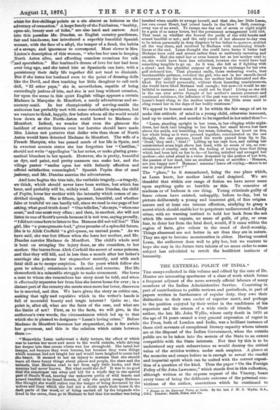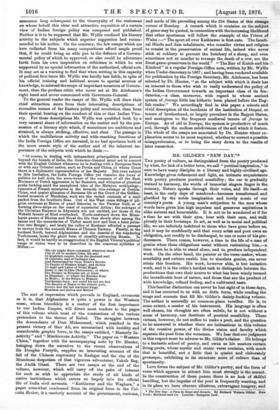THE EXTERNAL POLICY OF INDIA.*
THE essays collected in this volume and edited by the care of Dr. Hunter are interesting specimens of a class of work which forms a frequent adjunct of the more severely official labours of many members of the Indian Administrative Service. Consisting in part of contributions to public reviews and periodicals, in part of papers written in furtherance of regular duty, they owe their distinction to their own cachet of superior merit, and perhaps to the position enjoyed by their writer in the confidence of his superiors and the esteem of a wide circle of friends. Their author, the late Mr. John Wyllie, whose early death in 1870 at the age of 34 years caused a very general expression of regret in the Press, both of London and India, was a brilliant instance of those civil servants of exceptional literary capacity whose talents are at the disposal of the Indian Government, when the outside public are to be taken into the secrets of the State to an extent compatible with the State interests. Not that by this is to be understood any such subservience as would destroy the critical value of the articles written under such auspices. A glance at the memoirs and essays before us is enough to reveal the candid and impartial spirit which can be united with the correct exposi- tion of a question of the kind. Thus the paper "On the Foreign Policy of Sir John Lawrence," which stands first in this collection, although written at the express request of the Viceroy, bears every trace of being the deliberate outcome of the personal con- victions of the author, convictions which he continued to • Essays on Me External Policy of India. By the late J. W. B. Wyllie, M.A., Cal. London: Smith, Eider. sad Co.
announce long subsequent to the viceroyalty of the statesman on whose behalf this clear and attractive exposition of a certain view of Indian foreign policy was composed and published.
Neither is it to be supposed that Mr. Wyllie confined his literary activity to the subjects which superior suggestion had recom- mended to his notice. On the contrary, the few essays which are here collected from his many compositions afford ample proof that, if be could bring an able pen to the defence of a Govern- mental policy of which he approved, so also could he adventure forth from his own inspiration on criticisms in which he was
supported by no special information of the authorised, official sort. It may act as a warning to find that when writing in this capacity of political free-lance Mr. Wyllie was hardly less liable, in spite of
his official training and habitual access to special sources of knowledge, to misread the scope of important measures of Govern- ment, than the profane critic who never sat at Mr. Aitcheson's right hand and never communed with Governors-General.
To the general reader the essays of Mr. Wyllie will draw their chief attraction more from their interesting descriptions of recondite scenes of far Eastern polity and revolution than from their special bearing on the conduct of this or that Indian Vice- roy. For these descriptions Mr. Wyllie was qualified both by a very unusual share of information on the matter and by the pos- session of a literary style which, if sometimes too ambitious and strained, is always striking, effective, and clear. The passage in which the multifarious activity and wide-reaching functions of the India Foreign Office are narrated, is no bad specimen both of the more ornate style of the author and of the inherent im- portance of the subjects with which he deals :—
" Of course, in dealing with independent principalities and powers beyond the bounds of India, the Governor-General must act in concert with the English Cabinet whenever he is dealing with a European State or with any Oriental nation, such as Persia and China, at whose Court there is a diplomatic representative of her Majesty. But even subject to this limitation, the India Foreign Office yet remains the focus of politics for half Asia, the store-house of the romance of all the East. Murmurs of Dutch aggression in far Sumatra, and whispers of piratical prahs lurking amid the unexplored isles of the Malayan archipelago ; rumours of French enterprise in the feverish rice-swamps of Cochin- China, and quaint glimpses of Burmese life at the Court of the Golden- footed monarch of Mandalay, such are the varied contents of a mail packet from the Southern Seas. Out of the West come tidings of pil- grim caravans at Mecca, of pearl fisheries in the Persian Gulf, or of burning slave-ships on the coast of equatorial Africa ; the outrages of the Christian Emperor in Abyssinia are not omitted, nor those of the Wahabi fanatic at Rind overlooked. North-eastward down the Hima- layan passes of Bhutan and Nepal the life that slowly stirs among the lamas and the monasteries of Thibet sends now and then a faint pulsa- tion into Bengal ; and lately the valley of Kashmir afforded a passage to envoys from the uncouth Khans of Chinese Tartary. Finally, in the furthest North, beyond Afghanistan and the deserts of the wandering Turkomans, looms the giant form of steadily-advancing Russia. In fact, it would be hardly an exaggeration if the English Viceroy's political range of vision were to be described in the sonorous syllables of Milton:—
'Ills eye might there command, wherever stood City of old or modern fame, the seat Of mightiest empire, from the destined wall Of Cambalu, seat of Cathaian Can, And Samarcand by Oxus, Temir's throne, To Paquin of Shmean kings; and thence To Agar and Labor of Great Mogul, Down to the Golden Ohersonese; or where The Persian in Ecbatan sat, or since In ilispahan; or where the Russian Ksar In Mosco; or the Sultan in Bizance, Turchestan-born ; nor could his eye not ken The Empire of Negus to his utmost port, Ercoco, and the less maritime kings, Mombaza and Quiloa and Melind."
The sort of impression which prevails in England, erroneous as it is, that Afghanistan is quite a power in the Western sense, whose friendship is a matter of the first importance to our Indian Empire, will direct most readers to the pages of this volume which treat of the contentions of the various pretenders to the throne of Kabul. The struggles between the descendants of Dost Muhammad, which resulted in the present victory of Sher Ali, are summarised with lucidity and considerable graphic force, in the essays entitled, "Masterly In- activity" and "Mischievous Activity." The paper on "Western China," together with the accompanying note by Dr. Hunter, bringing down the narrative to the recent observations of Sir Douglas Forsyth, supplies an interesting account of the fall of the Chinese supremacy in Kashgar and the rise of the Musultuan despotism of that vigorous • adventurer, Yakub Beg, the Atalik Ghazi. There are two essays at the end of the volume, however, which will carry off the palm of interest for such as wish to appreciate the study of all kinds of native institutions which enters so largely into the official life of India civil servants. " Kathiawar and the 1Vaghars," a paper somewhat condensed from its original form in the Cal- cutta Review, is a masterly account of the government, customs, and mode of life prevailing among the 224 States of this strange corner of Bombay. A remark which it contains on the subject of game may be quoted, in connection with the increasing likelihood that other sportsmen will follow the example of the Prince of Wales :—" The sport all over Kathiawar is first-rate. The fanati- cal Hindu and Jain inhabitants, who consider virtue and religion to consist in the preservation of animal life, indeed who never stick at robbery to prevent the butchery of a sheep, and even sometimes not at murder to revenge the death of a cow, are the finest game-preservers in the world." "The Rao of Kutch and his Kindred" is a regular Foreign-Office note, written by Mr. Wyllie when Under-Secretary in 1867; and having been rendered available for publication by the Foreign Secretary, Mr. Aitcheson, has been selected by Dr. Hunter, "as the subject with which it deals has an interest to those who wish to really understand the policy of the Indian Government towards an important class of its feu- datories,—a class, moreover, with regard to whose ancient system of frerage little has hitherto been placed before the Eng- lish reader." We accordingly find in this paper a minute and vivid description of the incidents of the institution of bhayad, or tenure of brotherhood, so largely prevalent in the Rajput States, and analogous to the frequent medimval tenure of frerage in Europe. As of old in Europe, the system is productive of much evil, through the endless subdivisions of the soil which it fosters. The whole of the essays are annotated by Dr. Hunter where ex- planation seems to be most required, whether to correct a possible misapprehension, or to bring the story down to the results of later researches.































 Previous page
Previous page